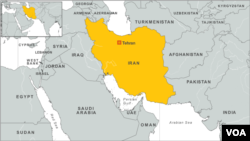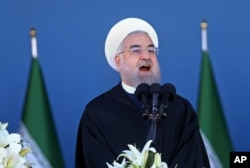U.S. human rights groups are condemning the sentences imposed by an Iranian court on four journalists who were arrested late last year. The four were accused of “paving the way for U.S. infiltration of the country.”
The Iranian judiciary has handed down sentences of five to 10 years in prison to the journalists who were arrested last November in the period leading up to parliamentary elections.
Afarin Chitsaz, Ehsan Mazandarani, Saman Safarzai and Davoud Asadi were convicted Tuesday of harming national security and spreading propaganda against the Islamic Republic.
Heavy sentences
A lawyer who represents three of the four journalists, Mohammad Alizadeh Tabatabai, told VOA’s Persian service that they were given heavy sentences.
He says that Davoud Asadi was given 10 years in prison and that Ehsan Mazandarani, who heads the Farhikhtegan newspaper, was given seven years. Afarin Chitsaz, a columnist for the government-owned Iran Daily newspaper who is also an actress, and Saman Safarzai, a columnist for the Andishey-e Puya magazine who is also known as Ehsun Sarfarzai, were handed five-year sentences, the lawyer added.
Paris-based Reporters Without Borders (RSF) denounced the sentences, saying they were part of a “tale of repression [being carried out] in Iran since the first of January.” RSF indicated that a fifth journalist, Issa Saharkhiz, was also sentenced, but the term was not revealed. Saharkhiz is reportedly recovering in a Tehran hospital from a heart attack suffered while on a hunger strike.
Judiciary spokesman Mehdi Mohseni told Iranian state TV that the judicial system was just doing its job, and that the sentences were “not final.”
Inside power struggle
Iran analyst Alex Vatanka of the Middle East Institute tells VOA that the journalists were arrested due to the ongoing power struggle inside Iran involving hardliners, including the Revolutionary Guards, and the more moderate forces supporting President Hassan Rouhani.
“It doesn’t make sense in any other way, but to look at what’s happening in the context of a power struggle that’s happening as we speak, and it’s a power struggle that’s going to get nastier and nastier as weeks and months go by, because there’s a succession crisis unfolding in Iran, because everyone is preparing for the day [Supreme Leader Ali] Khamenei leaves this world,” said Vatanka.
Vatanka adds that Ayatollah Khamenei has “given a blank check to the hardliners, including the Revolutionary Guards, to single out and punish those who damage the regime.”
Reporters Without Borders says 32 journalists are being detained in Iran and that Tehran is one of five major persecutors of the press in the world.





